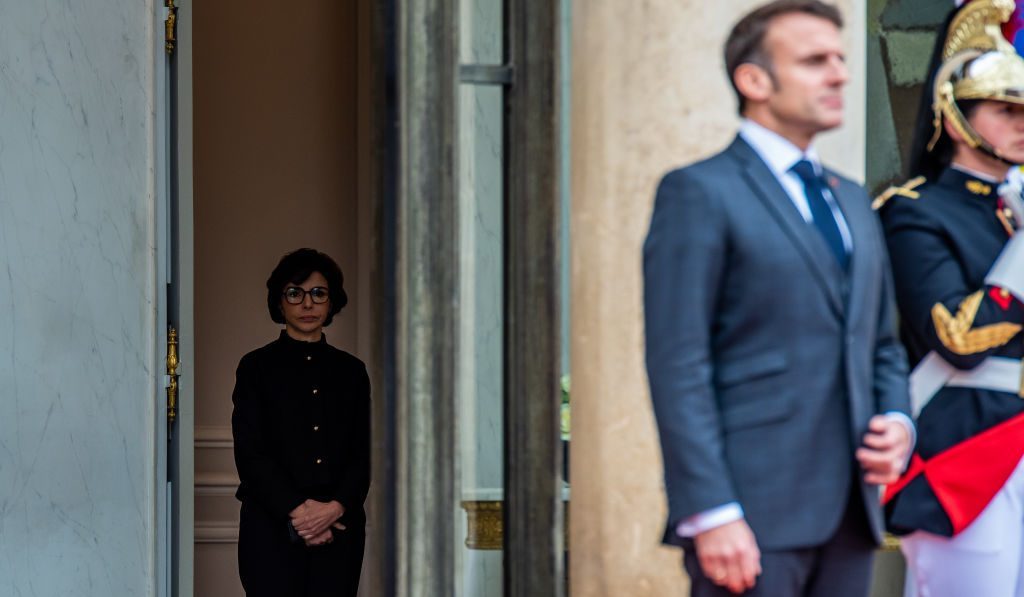PARIS – The battle to represent Paris’s poshest district has erupted into a political family feud, pitting EU heavyweight Michel Barnier against scandal-hit minister Rachida Dati – and creating a political headache for Emmanuel Macron.
This week, ex-EU Brexit negotiator Barnier secured the backing of France’s conservative party, Les Républicains (LR), to run in a key parliamentary by-election in the capital’s wealthy 7th arrondissement.
But the decision triggered a furious response from Rachida Dati – another LR big beast and mayor of the 7th arrondissement – who refused to back down and immediately announced she would run against Barnier in the September vote.
Dati, who also serves as culture minister in Macron’s cabinet had hoped to win support from both LR and Macron’s Renaissance party to also become the capital’s mayor in next spring’s elections. The post is a frequent launchpad for higher national office. However, recent allegations of corruption are undermining her chances.
The race is now exposing divisions among major figures on the French right, as the party’s nominating committee sought to ease tensions on Monday by describing Dati as the strongest voice for change in Paris after it had earlier endorsed Barnier’s nomination bid.
Barnier, for his part, assured that he had no mayoral ambitions in the capital.
A political headache
Dati’s ascent from a working-class immigrant background to minister made her a powerful symbol for the conservative right.
Her 2024 entry into Macron’s cabinet reflected both her personal clout and the president’s need to revitalise his party after electoral setbacks and gain ground in urban strongholds like Paris.
Macron’s party is indeed still hoping to win control of a major city, as it lacks a strong local power base. At the same time, LR is eager to reclaim Paris – once a conservative bastion under former President Jacques Chirac – according to Bruno Cautrès, a political scientist at Sciences Po.
“They both need a candidate who can stand out, but also one who isn’t entangled in legal affairs,” he said.
Dati is accused of accepting €900,000 in consultancy fees in 2012 from a subsidiary of Renault-Nissan while serving as a member of the European Parliament.
Dati, who has denied any wrongdoing, sat in the Parliament from 2009 to 2019 – a period during which lobbying by elected officials was tightly regulated. Her case is unlikely to be resolved before the September by-election and the 2026 Paris mayoral election.
A polarising figure
Dati is a divisive figure for both LR and Macron’s camp. Her surprise candidacy was seen as a power move ahead of the mayoral race, but LR quickly backed Barnier instead, viewing him as a steadier, less controversial choice.
Within Macron’s camp, the dilemma is even more acute. Justice Minister Gérald Darmanin, himself a former LR member, has publicly endorsed Dati. But others are increasingly uneasy about the risks she represents.
Former Europe Minister Clément Beaune criticised Dati’s attacks on the judiciary – after she accused magistrates of targeting her for political reasons – warning that “we are not in Trump’s America,” during a national television appearance.
One senior Renaissance official, speaking on condition of anonymity, warned that “half the activists [of Macron’s movement] in Paris would quit” if asked to campaign for her, arguing that she represents everything Macron’s movement was meant to oppose.
“Macron rose to power in 2017 on a promise of radical reform, a break from traditional party politics, and a commitment to irreproachable ethics,” said a former MP from his party.
“He dismissed four ministers – including François Bayrou, then education minister and now prime minister – over allegations just as serious as the ones Dati is facing today.”
A narrowing path for Macron
Yet Macron has no better option. Dati remains one of the few politicians with name recognition, electoral experience, and a functioning political machine on the ground – qualities that make her hard to ignore, despite her legal and political baggage.
Gabriel Attal, the former prime minister now leading Renaissance, has notably remained silent on Dati’s most recent moves. But she might also need his backing if she hopes to become Macron’s official candidate.
“The mayoral election will reflect the reshaping of French political life,” said Stéphane Zumsteeg, director of political research at Ipsos. “It’s also a litmus test for whether traditional parties still control their flanks.”
With both Dati and Barnier expected to run, some polls already indicate a potential split in the centre-right and conservative vote – a scenario that could ultimately benefit the left.
Others see it as a crash test for Macron’s already fragile alliance with the right. “This whole thing is starting to look like a revealing mirror of Macron’s party’s unpreparedness for the election,” said the senior member of the president’s movement, speaking on condition of anonymity.
And with a presidential race looming in 2027, the stakes in Paris are higher than ever.
(mm, cs)
